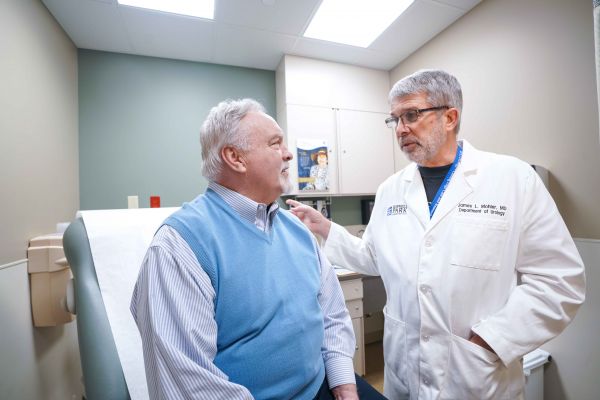Prostate cancer is a leading cause of cancer-related deaths in African American men and the one most commonly diagnosed in Hispanic/Latinx men as well. Men from both backgrounds are less likely to be diagnosed early and treated when the prostate cancer is in its early stages.
Two researchers from Roswell Park Comprehensive Cancer Center, Anna Woloszynska, PhD, and Dhyan Chandra, PhD, have received grants to continue their work investigating prostate cancer racial disparities. They aim to answer two key questions: How does prostate cancer develop in African American men, and why do African American men with prostate cancer face worse outcomes than Caucasian men? Dr. Woloszynska received a two-year, $613,000 grant from the U.S. Department of Defense to study the genetic and epigenetic vulnerabilities of prostate cancer in African American men; Dr. Chandra received a two-year, $240,000 grant from the American Cancer Society to study deficiency of a protein called cytochrome c in African American men.
“Out of any cancer in which we observe disparities, prostate cancer is the one where it’s so clear-cut and prevalent,” says Dr. Woloszynska, whose work will look at both genetic and epigenetic factors that might be driving prostate cancer — information about the genetic coding passed down from previous generations as well as the history of environmental, behavioral and other changes that have left their mark on our genes. “You see more aggressive cases of the disease in African American men and they’re usually diagnosed earlier in life. No matter how you look at the data, as a group, these patients get the worst-case scenario in every aspect of prostate cancer.”
African American men also face more difficulty in gaining access to care and treatment for their overall health, which creates another barrier when it comes to diagnosing prostate cancer at an earlier stage when it is not only more treatable but when less-invasive treatment options are available.
A cell death-inducing protein might be a factor in prostate cancer health disparities
It’s possible one of the reasons some men are more likely to develop aggressive forms of prostate cancer, especially African Americans, can be explained by a discovery Dr. Chandra made: Some African American men have a reduced level of mitochondrial genetic materials in their cells and, in addition, a lower amount of a mitochondrial protein, cytochrome c, which is important in allowing cells to die.
“If a cell is distressed or diseased and wants to die and be removed from the body, because it’s good for the body for unhealthy cells to be removed, the lower level of this protein prevents those damaged cells from dying and keeps them circulating,” Dr. Chandra says. “That might be one of the reasons why prostate cancer is more prevalent in African American men than in Caucasian men, who are less likely to have this deficiency. Our goal in this research is to find out how we can restore the level of cytochrome c to the level where it would be beneficial in fighting or slowing the progression of prostate cancer.”
The possibility of finding biological reasons behind the increased risk of developing prostate cancer, and finding a more aggressive type of cancer, in African American men, is the focus of Dr. Woloszynska’s research. “Our ancestry may be contributing to the phenotypes in a person’s biology that also may affect our increased risk to develop specific forms of cancer. Also, the environment plays an important role. We are not just our genes, we are the environment in which we grow up. It is very important to take into consideration all these factors when we study racial health disparities.”
Genetic Screening at Roswell Park
Read more information about genetic screening and genetic counseling at Roswell Park.
“There are well-established risk factors for prostate cancer, such as African ancestry, and many Hispanic/Latino populations have varied ancestry that often includes African heritage. It’s important for Hispanic men to know their risks as well,” says Elisa Rodriguez, PhD, MS, Director of Community Engagement Resource at Roswell Park. “Studying disparities in cancer helps us to better understand important differences that may be tied to various social environmental factors. It’s important that we understand cancer disparities in order to address inequities that may be driving differences in health outcomes.”
Working to find the cause — and develop solutions
Drs. Woloszynska and Chandra are working on their separate but overlapping efforts. “Prostate cancer disparities are multifactorial. Some research suggests that there are no molecular differences in prostate cancer types found in men with different racial backgrounds. Other studies say there are molecular differences. We need to solve this. We are looking at socio-economic conditions, community-level research, working with oncologists and understanding the biology of the population. If you disregard one group, we will not be able to solve the disparity problem,” Dr. Chandra says.
Representation is vitally important to advancing cancer research into understanding disparities, Dr. Rodriguez says. “Representation in the research at all stages of the research process is critical to help identify effective treatments and these projects are critical to that process. Equity also applies to the process of research and making sure that we are conducting research that is inclusive and representative of all groups and especially those who are disproportionally impacted by cancer.”
Never miss another Cancer Talk blog!
Sign up to receive our monthly Cancer Talk e-newsletter.





